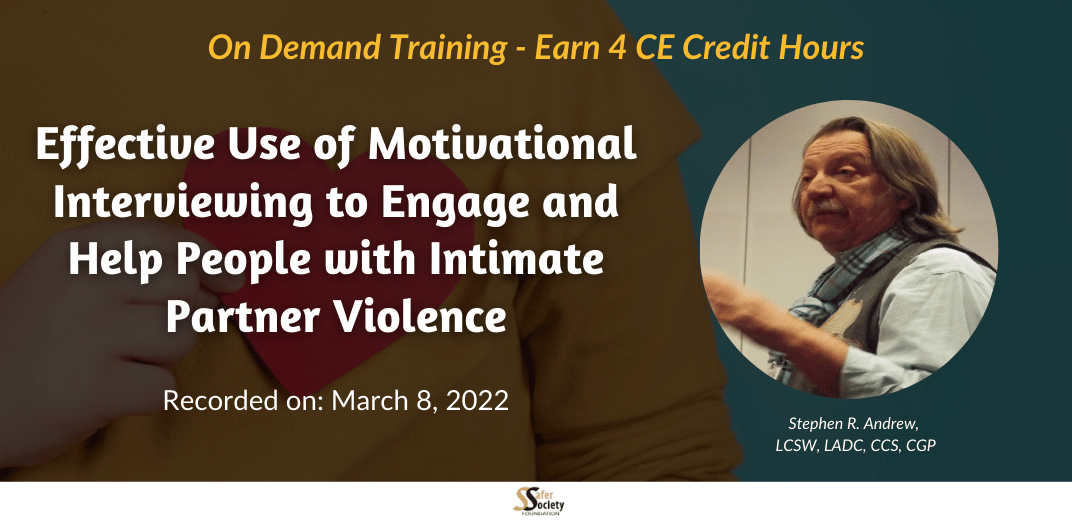
Effective Use of Motivational Interviewing to Engage and Help People with Intimate Partner Violence
Already purchased an On Demand training?
Click here to access your Safer Society On-Demand Training Center account.
Motivational Interviewing has emerged as one of the most critical and effective screening, brief intervention approaches when working with people to promote behavior change, especially in working with intimate partner violence.
Motivational Interviewing (MI) is a person-centered counseling approach that helps individuals explore and resolve ambivalence about change. After an orientation to the underlying spirit, structure, and skills of MI, practical exercises help participants of this training strengthen skills for demonstrating empathy, recognizing and eliciting “change talk”, and rolling with client discord/resistance.
The presenter, Stephen Andrew, employs Motivational Interviewing as a powerful teaching tool, providing participants with a firsthand experience of the effectiveness of MI. This interactive and experiential approach emphasizes the safety and comfort of those participating as well as the importance of safe interventions for all who are affected by intimate partner violence. The training explores MI’s use in working with substance use/misuse, criminal justice, chronic health care, and mental health with a focus on the client/patient relationship.
Topics discussed include:
1) Motivational Interviewing
a. Spirit of Motivational Interviewing (4 characteristics)
b. General Principles of Motivational Interviewing
c. Two Phases; ambivalence and action
2) How it differs from person-centered work, learning the need for complex empathic reflections to develop the ambivalence
3) “Righting Reflex”, understanding the depth of unsolicited advice
4) Accurate Empathic Reflection as an antidote to shame
5) Understanding Ambivalence
a. Change Talk, different types (known by the acronym DARN; desire, ability, reason, and need for change)
1) Demonstrate skills for deeply listening to and understanding clients
2) Describe four components of the “spirit” of motivational interviewing
3) Explain the difference between motivational interviewing and person-centered and other models of care
4) Enact skills for responding to others with complex, empathic reflective statements using open questions to “move” the conversation.
5) Identify “change talk” within a person’s statements
6) Provide a crisp empathic summary statement collecting change talk with a closing inquiry/ open question
Audience
This training is tailored to professionals, including psychologists, social workers, and counselors specializing in intimate partner violence who work within the criminal justice, health care, mental health, and social service systems.
Content Level
Disclosure
Continuing Education Approval
American Psychological Association (APA)
Safer Society Foundation, Inc. is approved by the American Psychological Association (APA) to sponsor continuing education for psychologists. Safer Society Foundation, Inc. maintains responsibility for this program and its content.
Who's Presenting

Stephen R. Andrew LCSW, LADC, CCS, CGP
Stephen R. Andrew LCSW, LADC, CCS, CGP is a consultant, trainer, co-author of Game Plan: A Man’s Guide to Achieving Emotional Fitness, storyteller, and Chief Energizing Officer of Health Education & Training Institute. He maintains a compassion-focused private practice in Portland, Maine (USA) where he also facilitates a variety of men’s, co-ed, couples, and caregiver groups. Stephen has been a member of the International Motivational Interviewing Network of Trainers (MINT) since 2003 as well as a MIA-STEP (Motivational Interviewing Assessment; Supervisor Tools for Enhancing Proficiency) trainer for the New England ATTC. Stephen has been MITI trained and has over 100 hours of training in Motivational Interviewing. He provides coaching and training domestically and internationally (Singapore, China, Iceland, Holland, Sweden, Poland, Turkey, & UK) for social service agencies, health care providers, substance abuse counselors, criminal justice, and other groups on Motivational Interviewing, addiction, co-occurring disorders, counseling theory, “challenging” adolescents, supervision, ethics for caring services professionals, men’s work, and the power of group work. Stephen also oversees HETI’s MITI Coding and coaching lab.
